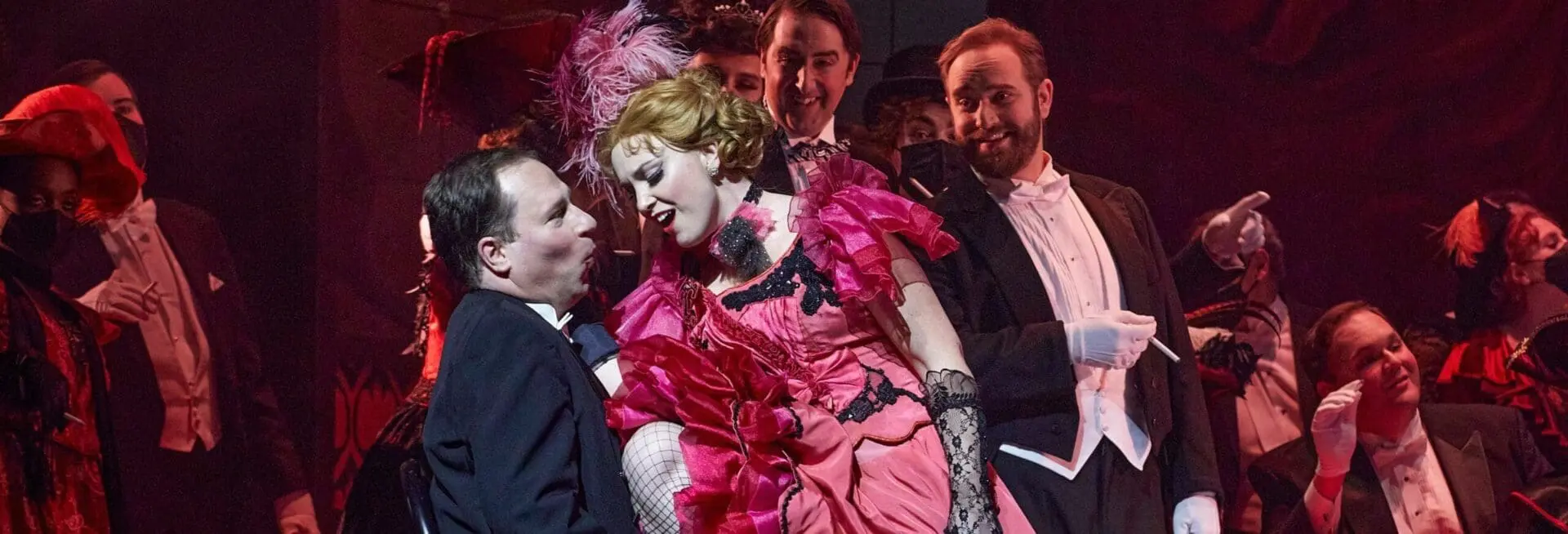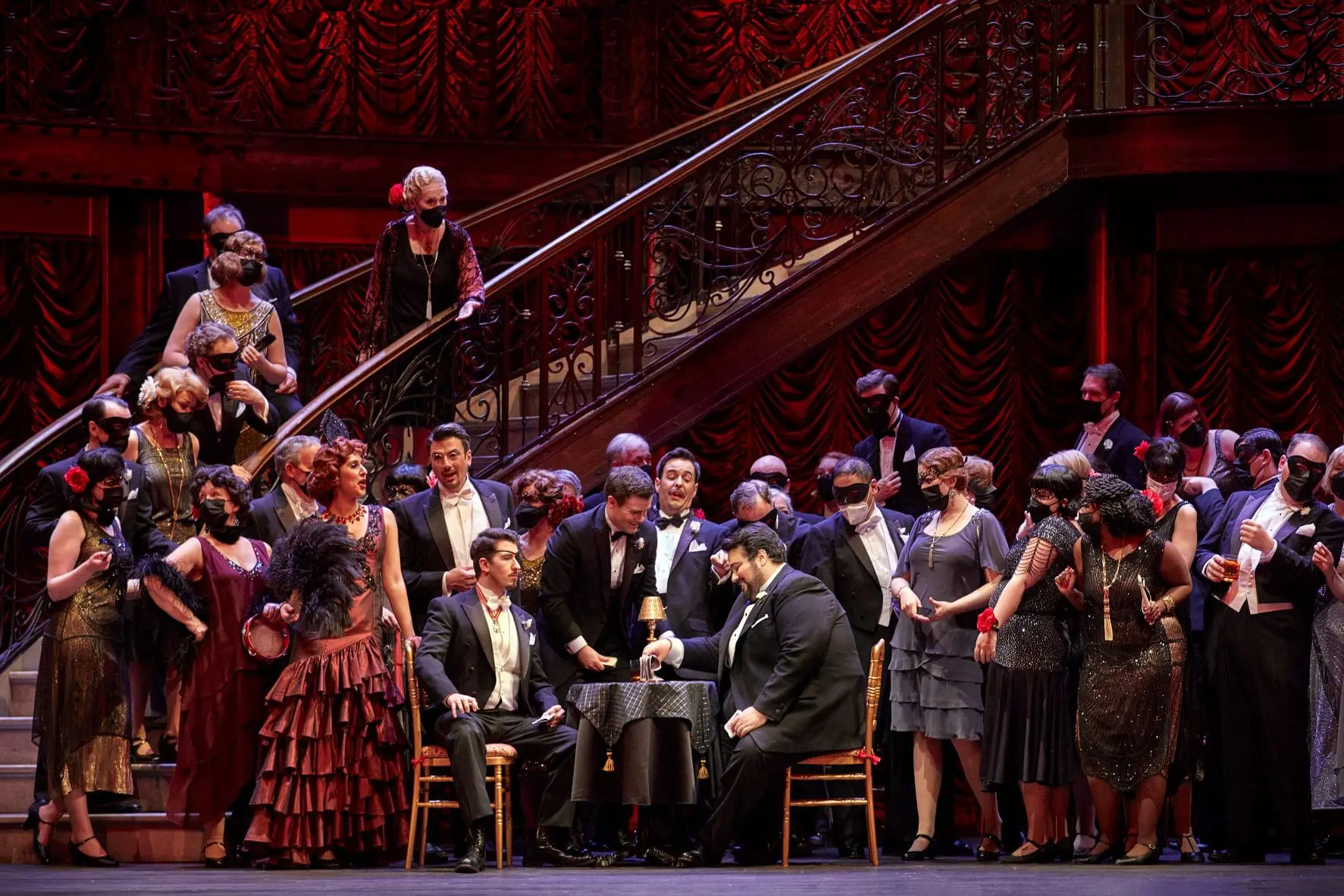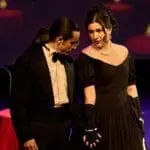Live opera has been hard to come by in Canada these past few months and where there have been performances, audiences have been forcibly limited in numbers. For its long-awaited return to the Jubilee auditorium, Calgary Opera was constrained to 50% audience capacity by government restrictions. As a company proud of its reputation for not laying off a single employee during the pandemic and for finding innovative methods to rehearse while adhering to strict social-distancing measures, the successful February run of Franz Lehár’s The Merry Widow was something of a miracle, if not an outright blessing that it happened at all.
That it was a high-quality evening of music-making made for an even greater triumph.
Together, Omer Ben Seadia’s admirable direction and conductor Tania Miller’s close reading of the score coaxed a lucid and authentic Viennese account of this popular operetta, one that was far more straightforward than—and preferable to—many contemporary concept stagings I have seen over the years. Their direct approach to the story added robustly to the Calgary Philharmonic Orchestra’s superb interpretation, underscoring the essential charm of the would-be lovers’ three-act dance around each other, both literally and figuratively. Well-designed sets and costumes from Utah Opera also helped, as did lighting, back lit to perfection, especially in Act II, that summoned the spirit of Belle Époque Paris with all its liveliness and colour intact.
Jeremy Sams’s recent translation of the German libretto lent a highly accessible English wit to the evening’s recreation of a story about a decadent louche—Count Danilo—who had his heart broken years earlier when he was forbidden to marry Hanna, his country-girl sweetheart who weds an older man instead. When Hanna is revealed to be a wealthy, “merry” widow, Danilo is awkwardly pressed into diplomatic service to marry her and so to keep her sizeable inheritance in his small, near-bankrupt country. The problem is that he can no longer bring himself to say the “three words” she most wants to hear for them to be married.
Andrew Love’s Danilo and Aviva Fortunata’s Hanna Glawari were an ideal match. Both have musical theatre in their blood, and it showed in every moment of stage action, dialogue, singing and acting. Even when they were not the focal point of the action, they managed to resonate a purposeful comic air. Best of all, Love’s Danilo provided the essential mock suavity and much-needed self-deprecation to match Fortunata’s charming wile and well-spun wit. The libretto is peppered with the usual saucy references to Danilo’s grisettes from Chez Maxim, where he covers up his heartbreak by leading a willfully lazy life, a source of unending humour and infinite opportunity for Love to ply his comic acumen. He was hilarious at every turn.
The problem with many performances of Merry Widow, even in prominent international productions, is that the comic timing can fall flat and the musical interactions between the characters do not flow quite as needed. But this was not so with in Calgary. Ben Seadia’s direction impressed in many places, including some of her larger comic set pieces, such as the Act II pavilion scene and the very busy Act III Chez Maxim finale. In the larger choral sections, while the Calgary Opera Chorus and the Calgary Opera McPhee Artists were perfect, the exquisite dances choreographed by former Alberta Ballet star Yukichi Hattori most often caught the eye. Hattori’s Parisian-styled ensembles proved the most diverting, whether in his manipulation of the two suitors in Act I or in the picayune, pseudo-Balkan dances of Act II. And of course, the Act III can-can scene Chez Maxim was a highlight for many.
Musically, the rest of the cast was splendid. Hugh Russell’s Baron Zeta played up the comical cuckold superbly, while Devon Dubnyk’s Njegus stole the show with a saucy deadpan served up as comic foil to the action.
Whether in the famous Act I quintet finale or the ludicrous male septet of Act II, the ensemble pieces glittered with comic brilliance. The operetta’s biggest hit, the “Vilja Song,” about a lovelorn wood sprite, was given broad room for us to appreciate it. Yet the Merry Widow Waltz, perhaps the most powerfully transformative piece ever written in three/four time, had the most impact—a symbolic reference of wistful love past, transmuted by the end of the operetta into blissful romance present.
Intriguing and at times alluring were the secondary love interest shenanigans of Camille de Rosillon, given a strong and dramatically attractive performance by lyric tenor Colin Ainsworth, and the consummately beguiling Valencienne, played to perfection by Jacqueline Woodley.
Their performances together were so compelling that I had to remind myself that the piece was not only about them. Often, I found it hard to adjust to the story’s central love interest, though the re-appearance of Love’s nuanced comic timing could easily bring me back.
And that is Merry Widow at its best. With performers like Love and Fortunata, even a walk across the stage must be perfect, every footfall of dialogue metrically accurate and every gesture and note scripted to match the situation. Ben Seadia’s direction made it so, and the studied efforts of a deeply talented cast rooted in the best operetta tradition helped create a memorable Merry Widow, much needed during a time marred by repeated tragedy and isolation.















